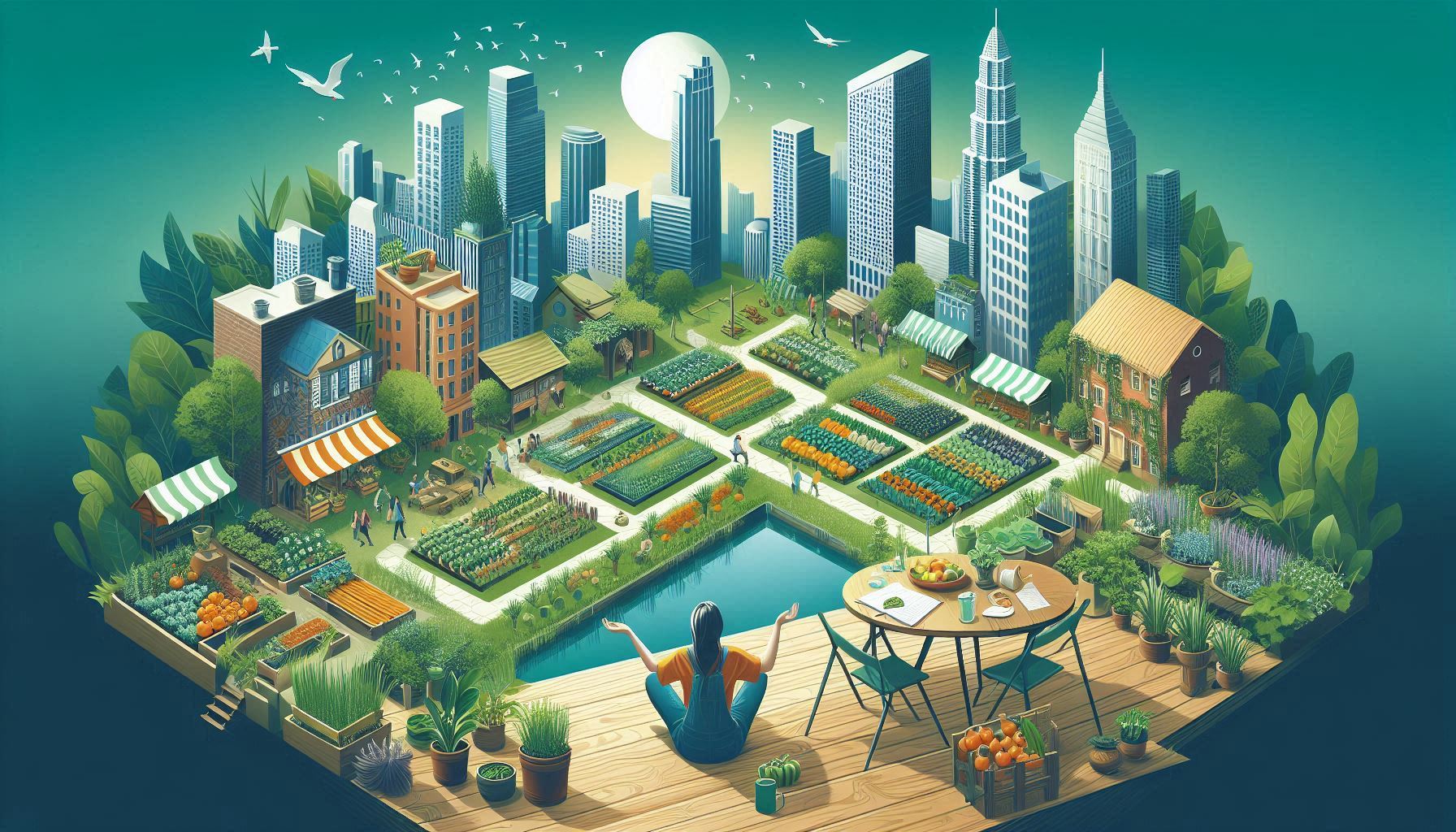Urban gardening has seen a resurgence in recent years as more people seek to reconnect with nature, improve food security, and create green spaces in densely populated cities. In the face of environmental challenges such as climate change, food insecurity, and loss of biodiversity, urban gardening offers a sustainable solution to promote self-sufficiency, reduce carbon footprint, and enhance urban resilience. By incorporating sustainable practices in urban gardening, city dwellers can contribute to environmental conservation, community engagement, and personal well-being. This article explores the principles of sustainable urban gardening, the benefits of adopting eco-friendly practices, and the challenges of implementing sustainability in a city setting.
Understanding Sustainable Urban Gardening:
Sustainable urban gardening encompasses a range of practices that prioritize environmental stewardship, resource efficiency, and social equity in garden design, maintenance, and production. Key principles of sustainable urban gardening include:
- Regenerative Agriculture: Embrace regenerative farming techniques such as no-till farming, crop rotation, and cover cropping to improve soil health, enhance biodiversity, and sequester carbon in urban gardens.
- Water Conservation: Implement water-wise irrigation systems, rainwater harvesting, and mulching to reduce water waste and promote efficient water use in urban gardens.
- Organic Gardening: Avoid synthetic pesticides, herbicides, and fertilizers, opting for organic, biodynamic, or permaculture methods to maintain soil fertility, protect pollinators, and support biodiversity.
- Local Food Production: Grow a diverse range of fruits, vegetables, herbs, and edible flowers in urban gardens to promote local food security, reduce food miles, and increase access to fresh, nutritious produce.
- Community Engagement: Foster community involvement, education, and collaboration in urban gardening initiatives to build social connections, empower residents, and promote environmental awareness.
Benefits of Sustainable Urban Gardening:
The benefits of adopting sustainable practices in urban gardening are manifold, encompassing environmental, social, economic, and health advantages for individuals, communities, and cities. Some key benefits include:
- Environmental Conservation: By practicing sustainable urban gardening, city dwellers can contribute to carbon sequestration, air purification, stormwater management, and wildlife habitat creation in urban areas.
- Food Security: Growing food locally in urban gardens enhances food access, promotes food sovereignty, and reduces dependence on imported, industrially produced food, thereby improving community resilience and nutrition.
- Health and Well-being: Engaging in urban gardening activities promotes physical activity, mental health, stress reduction, and connection to nature, leading to improved overall well-being and quality of life.
- Economic Empowerment: Urban gardening can provide opportunities for entrepreneurship, job creation, income generation, and skill development in communities, particularly in underserved or marginalized areas.
- Educational Opportunities: Sustainable urban gardening initiatives offer learning experiences, vocational training, and environmental education for people of all ages, backgrounds, and abilities, facilitating knowledge sharing, skill-building, and capacity building in urban environments.
Challenges of Implementing Sustainability in Urban Gardening:

While the benefits of sustainable urban gardening are compelling, there are challenges and barriers to overcome in the transition towards more eco-friendly, resilient urban food systems. Some common challenges include:
- Land Availability: Limited space, competition for land use, zoning regulations, and land tenure issues can pose obstacles to establishing and expanding urban gardens, particularly in densely populated, gentrifying, or industrialized areas.
- Resource Constraints: Lack of access to water, soil, seeds, tools, and gardening supplies can impede the success of urban gardening projects, hindering sustainable practices and community participation.
- Maintenance and Management: Urban gardens require regular maintenance, pest control, weeding, and soil amendments to thrive, which may require time, energy, and expertise that urban gardeners may lack.
- Social Equity: Disparities in access to green spaces, cultural relevance, language barriers, and income inequalities can hinder inclusive, diverse participation in sustainable urban gardening initiatives, impacting social cohesion and community empowerment.
- Policy and Planning: Inadequate support, funding, infrastructure, and policy frameworks from local governments, institutions, and stakeholders can hamper the scalability, impact, and longevity of sustainable urban gardening projects, limiting their effectiveness and sustainability.
Strategies for Promoting Sustainability in Urban Gardening:
To address the challenges of implementing sustainability in urban gardening and promote eco-friendly, resilient food systems in cities, it is essential to adopt proactive strategies, collaborative approaches, and innovative solutions. Some key strategies include:
- Community Partnerships: Forge partnerships with local organizations, schools, businesses, and government agencies to co-create urban gardening projects, share resources, and leverage collective expertise, networks, and support.
- Capacity Building: Provide training, workshops, mentoring, and technical assistance to urban gardeners, volunteers, and community members to enhance their skills, knowledge, and confidence in sustainable gardening practices and food production.
- Advocacy and Awareness: Advocate for green space preservation, urban agriculture policies, food access initiatives, and environmental justice efforts to raise awareness, mobilize support, and influence decision-making at the local, regional, and national levels.
- Innovation and Technology: Embrace innovative approaches such as vertical gardening, aquaponics, rooftop farming, and smart gardening tools to maximize space efficiency, resource use, and productivity in urban gardens, while reducing environmental impacts and carbon footprint.
- Evaluation and Monitoring: Establish monitoring mechanisms, data collection tools, and evaluation frameworks to assess the impact, effectiveness, and sustainability of urban gardening projects, identify success factors, and inform future planning, replication, and scaling efforts.
Case Studies in Sustainable Urban Gardening:
To illustrate the diverse forms, impacts, and approaches to sustainable urban gardening, consider the following case studies from around the world:
Detroit, Michigan, USA: The Detroit Urban Agriculture Movement has transformed vacant lots, abandoned buildings, and industrial sites into thriving community gardens, urban farms, and market gardens, revitalizing neighborhoods, fostering economic development, and promoting food justice in the city.
Singapore: The “Gardens by the Bay” initiative showcases sustainable gardening practices such as vertical gardens, green roofs, rain gardens, and hydroponic systems in a high-density urban environment, creating green lungs, biodiversity hotspots, and educational hubs for residents and visitors.
Havana, Cuba: The “Organoponico” urban agriculture model in Havana emphasizes organic farming, permaculture principles, and cooperative ownership in urban gardens and rooftop farms, providing fresh produce, employment opportunities, and resilient food systems in the face of economic challenges and limited resources.
London, UK: The “Capital Growth” network of community food gardens in London promotes sustainable gardening practices, urban beekeeping, seed saving, and composting initiatives to increase local food production, biodiversity, and community cohesion in diverse neighborhoods across the city.
Nairobi, Kenya: The “Urban Farming Initiative” in Nairobi empowers grassroots women and youth to engage in sustainable vegetable farming, microenterprise development, and environmental conservation in informal settlements, enhancing food security, income generation, and social empowerment in marginalized urban areas.
Sustainable urban gardening offers a transformative, empowering, and impactful approach to promoting environmental sustainability, community resilience, and healthy living in cities around the world. By embracing regenerative agriculture, water conservation, organic gardening, local food production, and community engagement practices, city dwellers can cultivate vibrant, biodiverse urban gardens that nourish bodies, minds, and ecosystems. Despite the challenges of land availability, resource constraints, and policy limitations, there are opportunities for innovation, collaboration, and advocacy to advance sustainable urban gardening initiatives and create greener, more equitable urban landscapes for present and future generations. Through education, empowerment, and collective action, we can sow the seeds of change, cultivate sustainable urban gardens, and harvest the fruits of our labor for a healthier, more resilient, and interconnected urban future.

